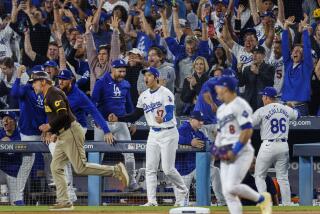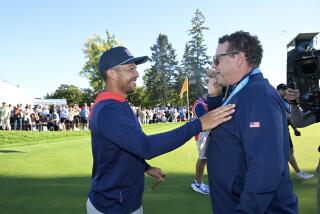Sampras Lets U.S. Slip on the Grass
- Share via
HOUSTON — The metaphor was within easy reach and almost inescapable, given the way seven-time Wimbledon champion Pete Sampras was struggling in the fifth set on his favorite grass-court surface against a Spanish clay-courter.
As Sampras went down a break in the fifth, the sun was going down behind the Westside Tennis Club here on Friday during the United States’ Davis Cup quarterfinal against Spain. After Sampras lost to Alex Corretja in a five-set stunner that lasted nearly four hours, the metaphorical question hung in the air.
Was the sun setting on Sampras’ legendary career?
It certainly appeared that way after Corretja defeated him, 4-6, 4-6, 7-6 (4), 7-5, 6-4, winning it with a 119-mph ace. That shocking result evened the quarterfinal matchup, 1-1, after Andy Roddick beat Spain’s Tommy Robredo, 6-3, 7-5, 7-6 (7), in the opening singles match.
Because Sampras had never lost on grass after winning the first two sets and Corretja possessed limited grass-court credentials--this was merely his 10th career appearance on the surface--doubts about Sampras’ future were bound to surface.
A Spanish journalist raised the point, asking the 30-year-old Sampras: “One thing like this today, does it make you think your career is coming to an end?”
Though it was a valid line of questioning, the interview room grew silent; amazingly, not even the squeal of a cell phone could be heard.
“That’s your opinion, isn’t it?” said Sampras, who has not won a tournament in almost two years. The questioner chuckled, nervously.
“Wait, is something funny? Do you think that’s funny?” Sampras said, sharply.
It wasn’t supposed to turn out this way. Nearly everything possible was done to make Sampras comfortable, short of moving this Davis Cup quarterfinal to the All England Club at Wimbledon. The USTA even passed on the chance to make more money by staging this event at a smaller club on grass to accommodate him.
The plan was running smoothly as Sampras easily took the first two sets, breaking Corretja in the fifth game of the first and the opening game of the second. But as often happens on grass, the crisis for Sampras unfolded quickly, in the third-set tiebreaker.
Corretja opened up a 6-0 lead, which included a service winner, a double fault from Sampras and two volleying errors from Sampras. Sampras fought off four set points, but Corretja won it on his fifth, ripping a forehand cross-court return winner.
It became clear that Corretja’s success would not be a one-set aberration in the first game of the fourth set. Sampras fought off a break point and needed four deuces to hold serve. “I think he started to slow down his second serve probably in the beginning of the third set,” Corretja said. “I was feeling like I have a nice moment to break him every time.”
Corretja broke him at 15 in the ninth game of the fourth when Sampras double-faulted. Sampras had 28 aces and 16 double faults, and oddly, was called for five foot faults. Corretja had 12 aces and 18 double faults. In the next game, Sampras got the break back to pull to 5-5 but lost his serve at 30 in the next game, and Corretja held to push it to a fifth set.
Over the course of his career, Sampras had lost only twice after winning the first two sets. But in the fifth set, Sampras hardly had the body language of a confident champion and lost his serve in the fifth game by double-faulting, missing long, on break point.
Corretja, the two-time French Open finalist, was the one with the fight and fire, and the one who went tumbling to the grass with a Boris Becker-type plunge on the first point of the final game, and held at love to finish off the memorable match.
“My first-time highlight,” Corretja said.
Said Sampras: “I’m kind of kicking myself a little bit. Just can’t afford to take your foot off the pedal on grass. Just for a moment. You know, it could change in a couple of minutes out there. And anything can happen, and it did.”
The small band of Spanish supporters was ecstatic. This had been designed as a form of American revenge on grass after the U.S. lost, 5-0, on clay in Santander in July 2000 in the Davis Cup semifinals.
Said one female reporter from Barcelona: “Now we can die. To win the Davis Cup and beat Sampras on grass. That’s all you can ask for.”
More to Read
Go beyond the scoreboard
Get the latest on L.A.'s teams in the daily Sports Report newsletter.
You may occasionally receive promotional content from the Los Angeles Times.











